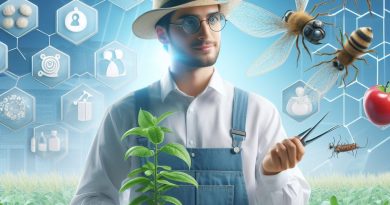Natural Pest Control: Organic Methods Unveiled
Last Updated on January 18, 2024
Introduction
Natural pest control refers to the use of organic methods to manage and eliminate pests.
These methods are crucial in maintaining a healthy environment and promoting sustainable agriculture.
In this blog post, we will explore the definition of natural pest control, discuss the importance of organic methods, and provide an overview of the content to come.
Natural pest control involves using naturally occurring substances and biological control agents to manage pests.
It avoids the use of synthetic chemicals that can harm the environment and human health.
Organic methods for pest control are essential because they prioritize the balance of ecosystems.
They promote biodiversity, protect beneficial insects, and reduce the contamination of soil, water, and air.
Utilizing organic methods also ensures the safety of food and protects the long-term sustainability of agricultural practices.
In this blog post, we will delve into various organic methods for pest control, including biological control, cultural practices, and physical barriers.
We will also explore the benefits and limitations of these methods. Additionally, we will provide tips on implementing natural pest control strategies in home gardens, farms, and other outdoor spaces.
By the end of this blog post, you will have a comprehensive understanding of natural pest control methods and the numerous advantages they offer.
Whether you are a professional farmer or a home gardener, these organic techniques can help you maintain a pest-free environment while protecting the health of our planet.
Stay tuned for more in-depth discussions on natural pest control methods.
Common Natural Pest Control Methods
Natural pest control is a sustainable and eco-friendly approach to managing pests without relying on harmful chemicals.
By utilizing organic methods, you can effectively control pests while minimizing harm to the environment and human health.
Biological controls
Biological controls involve introducing predators and beneficial insects into the ecosystem to control pest populations naturally.
These predators and insects feed on pests, helping to keep their numbers in check.
Some commonly used examples of biological controls are ladybugs, praying mantises, and nematodes.
These creatures act as natural predators and can significantly reduce pest populations.
Cultural controls
Cultural controls involve using specific agricultural practices to prevent or reduce pest infestations.
These practices focus on creating a balanced ecological environment that discourages pests and promotes plant health.
Crop rotation is a common cultural control method that involves changing the types of crops grown in a particular area each season.
This disrupts pest life cycles and reduces their ability to survive.
Companion planting, where certain plants are grown together to provide natural pest control, is another effective method.
Additionally, proper irrigation and watering techniques and mulching can create unfavorable conditions for pests and help plants thrive.
Physical controls
Physical controls involve physically preventing pests from infesting plants or removing them manually.
The use of traps and barriers is a common physical control method. Traps can be used to attract and capture pests, preventing them from causing damage.
Barriers, such as nets or fences, can be installed to create a physical barrier between plants and pests.
Manual removal of pests is also an effective method, especially for larger pests that can be easily identified and removed by hand.
Organic pesticides
Organic-approved pesticides are derived from natural sources and have low toxicity to humans and the environment.
These pesticides can be used as a last resort when other pest control methods have failed.
Pyrethrin-based insecticides are a commonly used organic pesticide, derived from the chrysanthemum flower.
They effectively control a wide range of pests while breaking down rapidly in the environment.
Horticultural oils, derived from plant sources, smother pests by coating their bodies and interfering with their respiratory systems.
In fact, natural pest control methods offer a sustainable and environmentally friendly alternative to chemical-based approaches.
By implementing biological controls, cultural controls, physical controls, and using organic-approved pesticides, you can effectively manage pest populations while safeguarding the health of your plants and the environment.
Embracing these methods not only reduces the dependency on harmful chemicals but also promotes the overall balance and health of ecosystems.
Natural pest control methods offer numerous benefits to both the environment and human health.
By utilizing organic techniques, we can effectively manage pests while minimizing the negative impact on our surroundings.
Read: Green Thumbs Up: Secrets of Organic Farming
Benefits of Natural Pest Control
Environmental benefits
One significant advantage of natural pest control is the preservation of beneficial insects and pollinators.
Chemical pesticides often harm these vital creatures, disrupting the delicate balance of ecosystems.
Additionally, natural pest control methods contribute to the reduction of water and soil contamination.
Chemical treatments can seep into the ground and water bodies, causing pollution that damages the environment and affects living organisms.
Health benefits
Eliminating chemical exposure risks to humans and animals is another crucial benefit of natural pest control.
Pesticides containing harmful substances can pose significant health hazards, especially when used in residential areas or near food crops.
Furthermore, organic pest control methods promote improvements in air quality.
Chemical insecticides often release toxic fumes that contribute to air pollution, which can lead to respiratory problems in humans and animals.
Long-term sustainability
Natural pest control practices contribute to long-term sustainability by preventing pest resistance to chemicals.
Over time, pests can develop resistance to specific pesticides, rendering them ineffective.
By using organic methods, we can avoid this issue and maintain control over pests.
Moreover, natural pest control helps in maintaining natural ecosystem balances.
Chemical treatments can disrupt the delicate relationships between pests, predators, and their habitats.
By opting for organic pest control, we ensure that these balances are preserved, allowing ecosystems to function optimally.
In short, natural pest control methods offer a wide range of benefits.
Not only do they protect the environment and maintain the health of humans and animals, but they also contribute to long-term sustainability by preventing resistance and preserving natural ecosystem balances.
By embracing organic pest control, we can create a healthier and more harmonious world.
Read: Regenerative Agriculture: Healing the Earth

Tips for Effective Natural Pest Control
Identify and monitor pest problems
To successfully implement natural pest control methods, it is important to first identify the specific pests you are dealing with.
Proper identification will allow you to choose the most appropriate control methods and avoid wasting time and effort on ineffective strategies.
Regular monitoring of pest populations will also help you catch infestations early on and prevent them from spreading.
Proper timing of interventions
Timing is crucial in natural pest control. Different pests have different life cycles and behaviors, and targeting them during vulnerable stages can greatly improve the success of control methods.
For instance, spraying insecticides during the early morning or late evening when pests are most active can maximize their effectiveness.
Additionally, tackling pest problems early on will prevent them from multiplying and causing greater damage.
Utilize integrated pest management (IPM) strategies
Integrated pest management (IPM) is a comprehensive approach that combines various pest control techniques to achieve long-term pest management.
This strategy focuses on preventing and minimizing pest damage through practices such as biological control, cultural control, and mechanical control.
By incorporating these methods into your pest control plan, you can reduce reliance on synthetic chemicals and promote a more sustainable approach.
Utilize diverse approaches in combination
Pests can quickly adapt and become resistant to single control methods.
To increase the effectiveness of natural pest control, it is recommended to use a combination of approaches.
This can include using physical barriers like nets or traps, introducing beneficial insects that prey on pests, and practicing good cultural practices such as crop rotation and proper sanitation.
By diversifying your pest control methods, you create a more challenging environment for pests and discourage their proliferation.
Regularly assess the effectiveness of methods used
Implementing natural pest control methods requires constant evaluation and adjustment.
Monitor the effectiveness of the control methods you are using by regularly inspecting plants for pest damage, observing pest populations, and assessing overall plant health.
If a method is not delivering the desired results, consider modifying or replacing it with a more effective alternative.
Regular assessment will help you fine-tune your pest control strategy and maximize its efficiency.
By following these tips, you can effectively manage pests in a natural and eco-friendly manner.
Remember that natural pest control requires patience, observation, and a willingness to experiment with different methods.
With perseverance and careful planning, you can maintain a healthy and pest-free garden while minimizing your impact on the environment.
Read: Rainwater Harvesting in Agriculture: A Guide
Challenges and Considerations
Limited control of certain pests
- Not all pests can be effectively controlled using organic methods.
- Some pests may require stronger chemical interventions to completely eradicate them.
Time and labor-intensive
- Organic pest control methods often require more time and effort compared to conventional methods.
- Regular monitoring, handpicking, and manual interventions can be time-consuming and physically demanding.
Knowledge and education required
- Organic pest control methods require a deep understanding of pest behavior, life cycles, and natural remedies.
- Educating oneself about organic solutions and techniques is crucial for successful pest management.
Availability and cost of organic-approved products
- Organic-approved pest control products may not be as readily available as conventional pesticides.
- The cost of organic alternatives can also be higher, making it a potential challenge for some farmers and gardeners.
Persistence and patience needed for long-term success
- Organic pest control is often a gradual process that requires consistent effort and patience.
- It may take several cycles of implementing organic methods before achieving the desired pest control results.
In a nutshell, while organic pest control methods offer several benefits, there are also challenges and considerations to be aware of.
Some pests may not be effectively controlled using organic methods, requiring additional interventions.
Organic pest control can be time-consuming and labor-intensive, demanding regular monitoring and manual interventions.
Acquiring the necessary knowledge and education about organic pest control is essential for success.
Availability and cost of organic-approved products may pose limitations for some individuals.
Lastly, persistence and patience are crucial for long-term success with organic pest control.
Despite these challenges, embracing organic methods can lead to a healthier and more sustainable approach to pest management.
Read: Biodiversity in Farms: Balancing Nature & Crop
Conclusion
Throughout this blog section, we have explored the various organic methods of natural pest control.
We learned about the importance of understanding pest behavior and identifying beneficial insects.
We also discussed techniques such as crop rotation, companion planting, and trap cropping, which help to deter pests naturally.
Additionally, we explored the use of natural predators, such as ladybugs and praying mantis, for pest control.
It is crucial for farmers to embrace and experiment with natural pest control methods.
These methods not only protect crops but also promote a healthy ecosystem on the farm.
By implementing organic pest control techniques, farmers can reduce their reliance on chemical pesticides, leading to a sustainable farming system.
Reducing chemical inputs not only benefits the environment but also enhances crop quality and food safety.
By minimizing pesticide use, farmers can produce healthier produce.
Furthermore, reducing chemical inputs leads to decreased costs for farmers, as they no longer need to purchase expensive pesticides.
Natural pest control methods offer a range of benefits for farmers, crops, and the environment.
It is imperative for farmers to embrace these techniques and contribute to a more sustainable agriculture industry.


